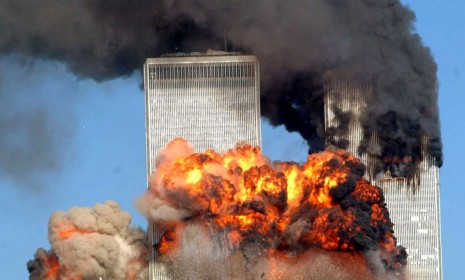What are the chances of another 9/11 happening in the next decade?
According to a pair of esteemed statisticians, the odds that another large-scale terrorist attack will unfold within 10 years are as high as 50-50

A free daily email with the biggest news stories of the day – and the best features from TheWeek.com
You are now subscribed
Your newsletter sign-up was successful
"As we approach the 11th anniversary of the 9/11 terrorist attack, we can be grateful that nothing like it has happened since," says George Dvorsky at io9. But that doesn't mean it couldn't happen again. Two statisticians — Aaron Clauset at the Santa Fe Institute in New Mexico and Ryan Woodward at the Swiss Federal Institute of Technology — put together a comprehensive global database and created an algorithm to predict the odds of a large-scale terrorist attack with similar or greater consequences happening again. Here's what you should know:
How do you predict a terrorist attack?
The same way you forecast earthquakes. While earthquakes themselves are "hard to predict with any reasonable accuracy," you can still make "very specific long-term forecasts that can help to dramatically reduce the number of fatalities," says Technology Review. "The death toll from earthquakes in the developed world, in places such as Japan and New Zealand, would have been vastly greater were it not for strict building regulations enforced on the back of well-founded predictions that big earthquakes were likely in future." In this terrorism study, researchers entered 13,274 terrorist events into a large-scale global database, dating from 1968 to 2007. Then, they created a "statistical algorithm for estimating the probability of similarly large events... within complex global systems" to predict the likelihood of another attack, says io9's Dvorsky.
The Week
Escape your echo chamber. Get the facts behind the news, plus analysis from multiple perspectives.

Sign up for The Week's Free Newsletters
From our morning news briefing to a weekly Good News Newsletter, get the best of The Week delivered directly to your inbox.
From our morning news briefing to a weekly Good News Newsletter, get the best of The Week delivered directly to your inbox.
What did they find?
They estimated that the historical probability of an attack on 9/11's scale happening at anytime in the last 40 years was somewhere between 11 and 35 percent. "That's important," says Technology Review. "It means that 9/11 itself was not at all unlikely given the pattern of terrorist activity leading up to it." Assuming that the number of terrorists events per year remains roughly what it is now (2000 per year), the likelihood of another large-scale terrorist attack anywhere in the world (with a death toll greater than or equivalent to 9/11) is between 20 and 50 percent over the next decade. A 50-50 chance, the top of that range, means "a catastrophic attack is as likely as not."
Is that probability set in stone?
Conditions might change. If the number of current attacks in Iraq or Afghanistan were to go down (for whatever reason), then the chances of a large-scale attack could also drop considerably, perhaps to something between 5 and 20 percent.
A free daily email with the biggest news stories of the day – and the best features from TheWeek.com
Why go through all this trouble?
"All this said, and on the face of it, their 50 percent normative assessment seems profoundly unsatisfactory," says io9's Dvorsky. It's like a weatherman saying there's a chance it might rain, or it might not, and seems like "a hell of a lot of work simply to produce a rather wishy-washy prediction." And the formula isn't perfect, says the Daily Mail. For example: It doesn't consider "increased security around the world" or the "billions of dollars the U.S. and other developed nations have poured into preventing additional catastrophic attacks." Still, says Technology Review, data predicting the odds of a massive attack is, undoubtedly, "something worth considering."
Sources: Daily Mail, io9, Technology Review